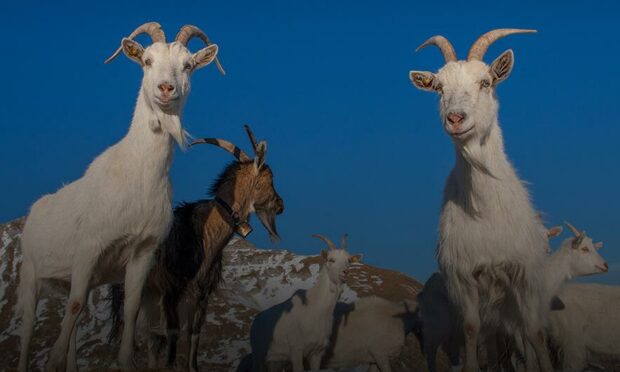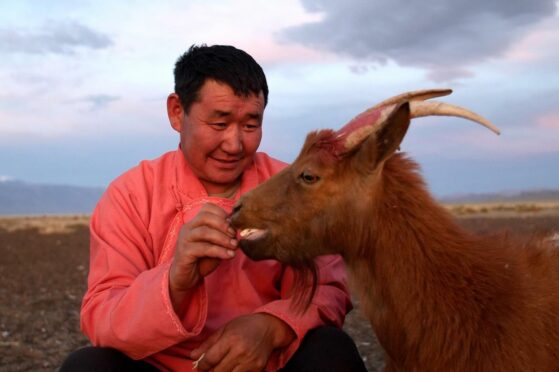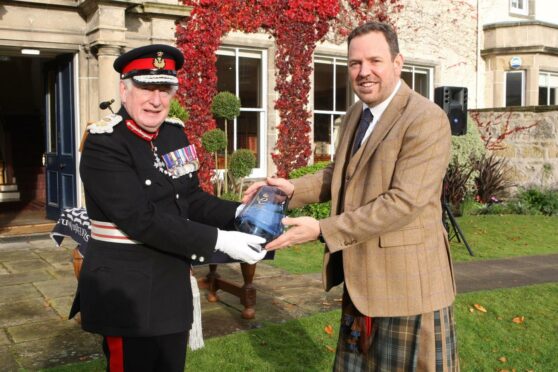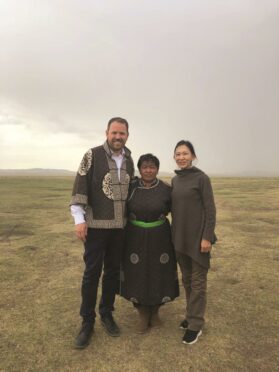Johnstons of Elgin has been working closely with Mongolian goat herders who supply the cashmere fibre the company uses to make a range of luxury goods such as scarves and jumpers for over 170 years.
It is a centuries-old way of life for the nomadic people who care for an estimated 1.2m goats, whose hair is carefully harvested by hand with a comb.
The Sustainable Fibre Alliance (SFA) estimates up to one-third of Mongolia’s population are dependent on the cashmere industry for the their livelihoods.
However this way of life is fragile. Climate change is threatening to change the grasslands which herders use to sustain the animals into deserts, while global demand for the luxury fibre is also growing potentially beyond sustainable levels.
Johnstons of Elgin is now the UK’s largest independent producer of cashmere and fine woollens. Established in 1797, the Moray firm is one of the last few remaining vertical mills in the UK that still process the raw cashmere and fine woollen fibres right through to the finished product.
In 2015 it was also one of three founders of the non-profit SFA, which was set up to sustain the pasture lands and welfare of animals in cashmere producing regions. There are now over 40 members including some of the world’s leading luxury brands.
The organisation has pioneered the implementation of a sustainable grassland management training programme for young Mongolian herders, which ensures young herders can learn modern sustainability practices while upholding their centuries-old traditions and cultural heritage.
Simon Cotton, the chief executive of Johnstons of Elgin, has been travelling regularly to Mongolia and Inner Mongolia in China, where herders are no longer nomadic and instead now graze their goats on privately owned, fenced pastures for years.
He said: “We haven been working with the SFT to work with the herders in Mongolia and the farmers in China on looking after the grassland and looking after animal welfare so they can fight off the challenges they are seeing with climate change.
“Already in Mongolia we are seeing the climate change nearly 2 degrees above what the worldwide target is for global warming. They are seeing degradation of the grassland.
“That coupled with overgrazing is driving severe problems in the industry.
“We are are working on a collaboration now with other brands to make sure we can look after that grassland as well as we can.”
Family-owned Johnstons runs mills in both Elgin and Hawick.
It has visitor centres at both sites, as well as retail outlets in Edinburgh, St Andrews and London and recently opened an outlet store in Kildare, Ireland.
The company, which employs around 1,000 people, was recognised in the sustainable development category of this year’s prestigious Queen’s Awards for Enterprise.
The Elgin firm received the Queen’s Award for Enterprise for Sustainability at a ceremony held last week in the gardens of the firm’s mill and shop.
Delayed due to lockdown restrictions earlier in the year, the award was presented by Major General the Honourable Seymour Monro, Lord Lieutenant of Moray on behalf of The Queen.
It is the fourth award Queen’s Award for the Moray-based manufacturer, having previously landed the honour for export achievement in 1978,1994 and 2002.
As well as its centuries old approach to working with natural, renewable, and biodegradable fibres, Johnstons’ was praised for its wider industry commitments to limiting environmental impact, animal welfare, its people and approach to sustainable textiles manufacturing.
For example, the firm has eliminated harmful chemicals from its supply chain, while 100% of the wool bought by the firm is certified to the ‘Responsible Wool Standard’.
And although it still uses gas to power some if its operations, it has reduced its carbon emissions by 53% between 2016 and 2020 through technology advancements and increasing the use of renewable energy across manufacturing sites.
It has redesigned its customer packaging, which now features 100% FSC recycled paper and has reduced shrink wrap shipments by 65%.
In 2019, Johnstons has also launched the EveryYarn range, which uses the leftover yarn from its main collections, reusing 97% of its waste materials, in 2019.
The firm has also partnered with “conscious fashion” firm, Cashmere Circle to support customers who wish to return garments to be repaired or resold and enabling the garment to start a new life with a new owner.
Making every thread count
Mr Cotton said: “When we talk about sustainability at Johnstons of Elgin, we try to cover every aspect of our product’s life as well as the value of every thread.
“Throughout our 224-year history we have stayed true to this ethos through animal welfare initiatives, grassland preservation, fair work, reducing manufacturing waste, and so much more.
“The reduction of waste and regeneration of resources has been part of our business for hundreds of years and receiving this award coincides with a significant period for Johnstons of Elgin as we move to the next phase of our sustainability programme.
“We recognise we are on a journey and our commitment to sustainability is unwavering.”




